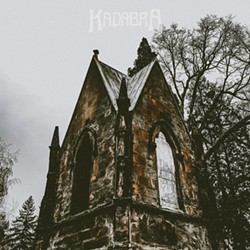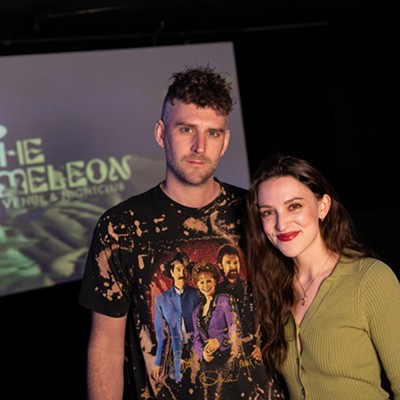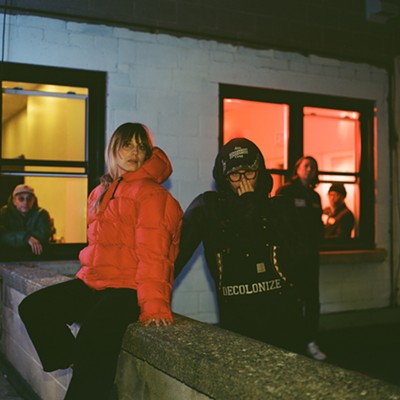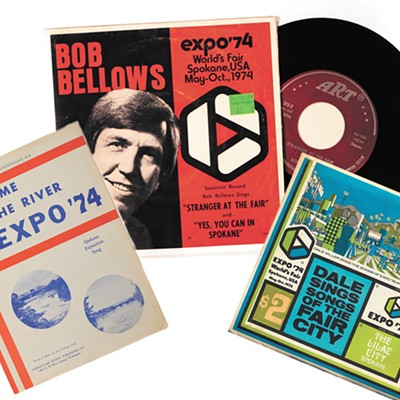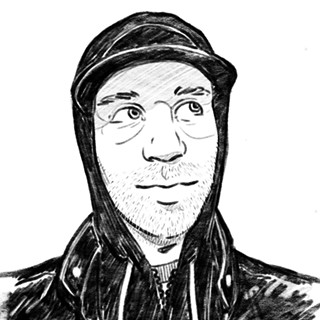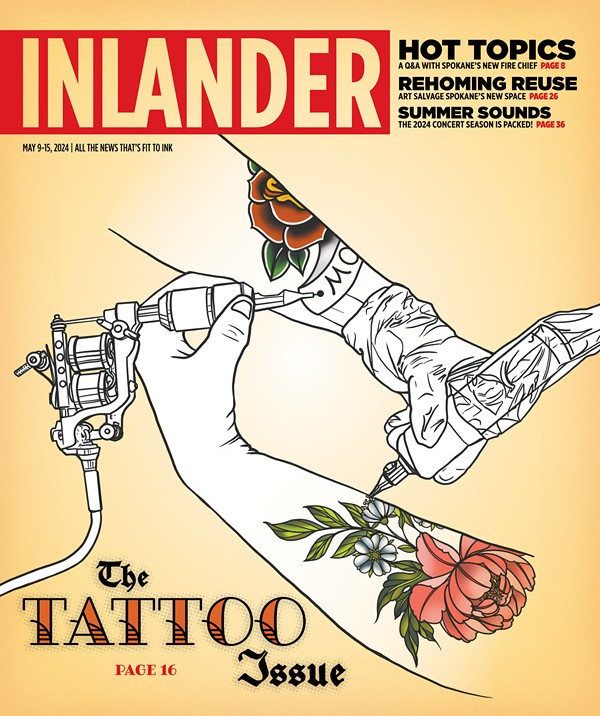
There's plenty of horror-based rock music to throw on during Halloween season: Misfits, Ghost, AFI, Alkaline Trio, Lordi, Heavens, and more death metal bands than I could possibly list. But if you're looking for a little local sonic darkness (that's less overtly horror-focused), Kadabra might just scratch your spooky season itch.
Formed in 2020, the Spokane trio of guitarist/singer Garrett Zanol (who also fronts the popular local fuzz rock band Indian Goat), bassist Ian Nelson and drummer Chase Howard leans into massive heavy rock riffs with echo-y effects to create dark and driving psychedelic music for headbanging stoners. Kadabra is more of a pummeling listen than a punishing one — things are gonna get hard but there's an almost graceful melodic underpinning to the atmospheric vibe the band creates (aided by Zanol's clear and never-overdone vocals).
Since releasing its debut album Ultra in September 2021, Kadabra has actually built up a bigger following outside of Spokane than in the Lilac City, touring internationally and selling out shows in bigger markets.
Earlier this month, Kadabra put out its second LP, Umbra (via Heavy Psych Sounds Records), which sees the band further expand its heavy reaches with standout tracks like "The Serpent" and "The Devil" (that one for sure fits the season). And this Friday, Kadabra will turn the District Bar into their atmospheric stoner rock den when the group plays Umbra in its entirety with Blake Braley joining the mix on organ (plus Death Chant and Itchy Kitty rounding out the bill).
Before the gig, we caught up with Zanol to chat about the new album, drunken basement jamming, avoiding gravely vocals and breaking out of the Spokane scene.
So how does your approach differ in actually doing that as opposed to just doing the drunken stoner basement jam method? Still drunk and stoned, for sure. [Laughs.] But, like I said, there’s just more purpose. Like, “Let's write 30 riffs and pick the best eight.” And so that's what we did. We wrote a shitload of music. I think we wrote Ultra in like a month. And this we spent, we spent quite a bit more time on it. We worked on it for about a year-and-a-half. Do you have any favorite aspects about Umbra? There's a track that's included on the CD that's not pressed to wax for the reason of time constraints, that's basically a callback to a song we recorded. We have a song called “The Serpent” on the album, but then I recorded a very intimate acoustic version of that song (“The Serpent II”) to end the album [on the CD]. Which is something I've always respected in music — hearing different variations. What were the inspirations that helped spark the creative process on Umbra? This whole process of writing Umbra was a very trying time personally in my life. Still is. So there's a lot of emotion put into this album. Not only musically, but also lyrically, this album is very dark. I guess with misery comes creation in a sense, as an outlet. So that was kind of a big part of where I was at mentally writing this, that was kind of driving the eeriness of it. Since the heavy atmospheric instrumentation is the core of Kadabra, how do you determine when to incorporate lyrics into the mix? We jam the songs a lot. A lot. We'll play a song maybe 20 times before I find a vocal melody that sounds good on top of it. We are pretty good about being like, “OK, this is a good verse riff. So definitely vocals will be here. And this is a pretty good hook, so this will be the chorus.” But we'll jam the song a lot, and I'll just sing bullshit and gibberish over the top of it until I find a melody that sounds good. And then a lot of times by the time we get to the studio, I don't have lyrics written at all. So it’s kind of all over the place. In your mind, how do you differentiate Kadabra material from Indian Goat material? They’re definitely different brain spaces. Indian Goat was created just to be a rock and roll balls-to-the-wall two-piece fun slide rock project. And then I have always had a passion for psychedelic music, stoner rock, desert rock and anything like that. Prior to Indian Goat, I was in a band called Blackwater Prophet. So Kadabra was kind of just me wanting to play Blackwater stuff again, but make it heavier. There are a lot of stoner rock bands that are very similar. I think there’s honestly comfort in knowing like, “Oh, this band's good, because it's exactly like the other one that I listened to.” We wanted to get out of that. The music is similar in a sense, but we don't have these grungy spooky f—-ing yell at you, gravel-in-your-throat vocals. The goal behind it was to have a big heavy sound with almost a pretty vocal on top of it. And I think we get close to that vision that we had, but I guess I'm my biggest critic. So what’s on the horizon for Kadabra? We’re just doing five shows [for the rest of] the year, and then looking to go back to Europe in the spring. We’ll be touring a lot. We don't play a lot of local shows, so it's nice to try to just do them... rarely. Yeah, it seems a lot of Spokane’s better bands don’t actually enjoy playing local shows. It's not a super strong scene here in Spokane, which is a big reason why we chose to not try to take Kadabra in the direction of being a “Spokane band” by any means. F—- dude, we sell out Seattle, we sell out Portland, we sell out LA. I think the Spokane scene is fine, but it's obviously taken a big hit since COVID. But the last handful of local shows I’ve been to are dudes in their early 20s and late teens just coming out of nowhere, and it's f—-ing awesome to see it again, because I've been on a stage in this city since I was 15.
Kadabra, Death Chant, Itchy Kitty • Fri, Oct. 27 at 8 pm • $15 • 21+ • District Bar • 916 W. First Ave. • sp.knittingfactory.com

